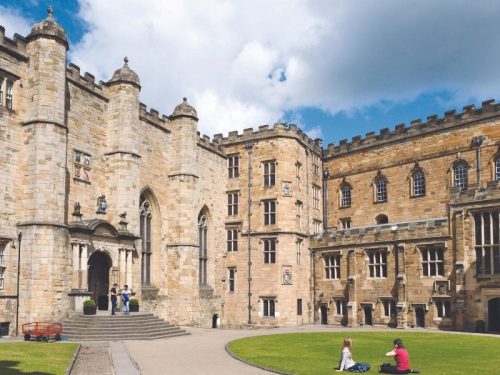No products in the cart.
Durham University, United Kingdom
The third oldest in Britain after Oxford and Cambridge, this low-profile university has acquired an enviable global reputation for higher education excellence, writes Reshma Ravishanker

Durham University vista: enviable global reputation
Sited in the eponymous historic city of north-east England, the low-profile Durham University (estb.1832) has acquired an enviable global reputation for higher education excellence. The Guardian University Guide 2021 ranks it #4 in the UK while in the QS World University Rankings 2022 Durham is ranked #82 worldwide. Moreover, for 16 subjects it is ranked in the Top 100 of QS World Rankings by Subject 2021 with archaeology rank #4 and theology and religion #5.
Founded 189 years ago, Durham is the third oldest university in Britain after Oxford and Cambridge and like them is a collegiate institution, i.e, every student is admitted into one of its 17 colleges — Collingwood, Grey, Hatfield, John Snow, Josephine Butler, St. Aidan’s, St. Chad’s, St. Cuthbert’s Society, College of St. Hilda and St. Bede, St. John’s, St. Mary’s, South, Stephenson, Trevelyan, University, Ustinov and Van Mildert. All these colleges are residential and teaching and research institutions.
Currently, the university’s 26 departments/schools offer over 200 undergraduate and 100 postgrad degree programmes to 20,268 students from 130 countries. Notable alumni include former England test cricketers Andrew Strauss and Nasser Hussain, former rugby player Will Carling, journalist Shelagh Fogarty and actor-comedian Nick Mohammed.
Durham. Widely acknowledged as the historic capital of north-east England, Durham (pop.423,000) is an important centre of culture and learning, and not least, a corner of England endowed with nature’s bounty. The city is replete with Gothic-style churches and cathedrals. The most important among them is Durham Cathedral, billed as one of the architectural marvels of Europe. Constructed in 1093 it is the shrine of St. Cuthbert and together with Durham Castle is a designated Unesco World Heritage Site. Moreover, its botanical gardens, parks and River Wear which winds through the city, offer an invariably uplifting experience of ancient cathedrals and pleasant walkways.
Durham is three hours from London and two hours by train from Edinburgh. Summers are warm (130C) and winters cold (50C).
Campus facilities. The university’s colleges are spread across two campuses — Durham City and the Queen’s Campus in Stockton-on-Tees (28 km from Durham). The main Durham campus is an integral part of the city. Most arts and science faculties and ‘peninsular colleges’ are set among shops and residences close to the city centre. Among colleges, University College, popularly known as ‘Castle’ is the oldest and shares its campus with the historic Durham and St. Cuthbert cathedrals. The hill colleges are sited on an elevated slope, a 15-minute walk from city centre. Since Durham is a compact habitat with excellent pedestrian access to all parts, lecture halls, tutorials, laboratories and libraries are a short often picturesque five-15 minutes walk from students halls of residence.
Inaugurated in 1992, the Stockton campus offers state-of-the-art facilities including technology enabled classrooms, modern library and common areas for students. It hosts the Wolfson Research Institute and the Durham University International Study Centre. Apart from excellent library and computer equipment, both campuses also provide facilities for numerous sports, social and entertainment activities.
Admission. Applications for admission into undergraduate degree programmes at Durham have to be made through the Universities and Colleges Admission Service (UCAS). The UCAS code for Durham is D86. Applications should be submitted online at www.ucas.com. The application deadline is January 15 for term beginning September.
Minimum eligibility requirement for admission into Durham’s undergrad programmes is successful completion of class XII (CBSE, CISCE and select state boards) with an average of 83-90 percent (four subjects). In addition, students have to provide proof of proficiency in English language (IELTS, TOEFL, PTE Academic test scores).
For admission into postgrad programmes, eligibility requirements are English language proficiency and completion of a three/four-year undergraduate degree from a recognised university in India.
For further information, visit www.durham.ac.uk.
Accommodation. Apart from academic instruction, Durham’s 17 colleges also offer residential facilities. All first year undergraduates are guaranteed college-managed accommodation. Each college offers single or twin sharing rooms with en suite or shared bathrooms and catering options (three meals per day) during term. Other facilities include laundry, Internet and shared pantry/kitchen.
Housing options at the Stockton-on-Tees campus comprise modern halls residence (Rialto Court) within walking distance of the university’s social and academic facilities.
Degree programmes. Durham’s 17 colleges offer a wide range of undergraduate and postgraduate study programmes including single and joint honours, single honours with subsidiary subjects and combined honours in arts, science and social sciences.

Durham University’s Stockton campus
Scholastic Options at Durham
The university’s 26 academic departments offer a wide range of study programmes. They include: Anthropology, archaeology, accounting, biological sciences, business, chemistry, computer science, classics and ancient history, criminology, English literature, economics and finance, earth science, education, engineering, geography, history, international relations, law, linguistics, management and marketing, mathematics, modern languages, medicine, music, natural sciences, philosophy, physics, politics, psychology, sports, exercise and physical activity, sociology, theology and religion.
Tuition fees (per year): £24,500-28,500
Living expenses (incl. accommodation): £12,000;
NB: £=Rs.101
Also Read:Curtin University, Western Australia















Add comment